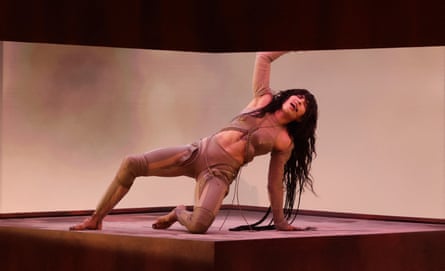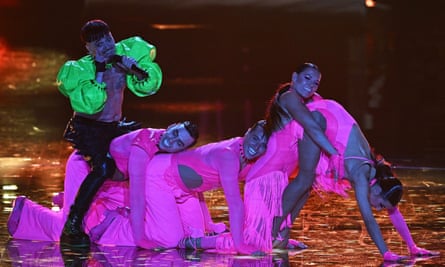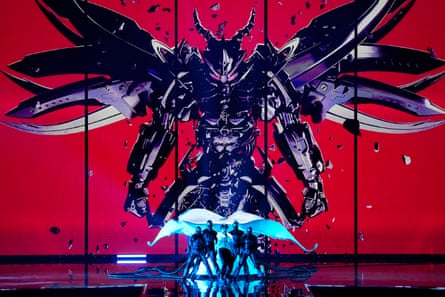It’s the most exciting, unpredictable, surreal night of television. And this year, it’s taking place in the UK. Let this be your guide for the acts to watch out for, the weirdest lyrics and a bluffer’s guide to the scoring. Now if you will excuse me … ahem … let the Eurovision song contest begin!
How we got here
Last year’s winners were Ukraine’s Kalush Orchestra with the song Stefania. It dominated the public vote, receiving a record 439 points (that’s the maximum 12 points from nearly every other country) and 631 points in total. Traditionally, the winner hosts Eurovision the following year, but the ongoing war in Ukraine made that impossible. So as the UK’s Sam Ryder came second (with Space Maaaaaaaaan), the BBC offered to host.
Although the event is in Liverpool, this is very much a show for Ukraine. Kalush Orchestra will open the grand final, followed by performances from famous Ukrainian entrants during the traditional Flag Parade (which Graham Norton once described as “a new innovation … to make the evening just that little bit longer”). These acts include Jamala (winner of Eurovision 2016), Tina Karol (represented Ukraine in 2006), and Verka Serduchka (whose 2007 entry Dancing Lasha Tumbai is the stuff of Eurovision legend).
Timur Miroshnychenko, who commentated for Ukrainian viewers from a bunker in Kyiv last year, will make frequent cameos from his commentary box in the arena. And alongside hosts Hannah Waddingham (a sensational host, who after speaking in French at the semi-finals, followed it up with “some of us Brits do bother to learn another language”) and Alesha Dixon will be Julia Sanina, from Ukrainian band the Hardkiss. Norton will also somehow juggle presenting and commentating, with Mel Giedroyc filling in whenever he’s on stage. (“Is he going to use a jet pack? Is it going to be on a zip wire?” Giedroyc asked the BBC’s Eurovisioncast podcast.)
The interval will also feature a collaboration between six Eurovision icons, from Iceland’s Daði Freyr (the entrant for the cancelled 2020 event and the 2021 contest, who wore a green jumper containing a Lego version of his own face) to Liverpool’s own Sonia, who represented the UK in 1993. For Eurovision fans, it is a fever dream.
Ones to watch

Crank up the wind machine … Loreen is back! The winner of Eurovision 2012 is hoping to take the trophy back to Sweden, this time with a song called Tattoo – which is currently the hot favourite. It’s not as much of a banger as her last entry, Euphoria (honestly, what song is?), but her performance really stands out. A song all about fighting for love, it starts with her lying down between two LED screens, which look like a giant panini press that she slowly prises apart. The screens she used during Melodifestivalen, the Swedish TV show that chooses their entry, were so huge and hefty (reportedly weighing a tonne) that for Eurovision she’s having to use smaller ones on wheels, so they can be rolled out of the way in time for the next performer. If Loreen wins, this will be the seventh time Sweden has won the contest, matching all-time record holder Ireland, who failed to qualify.
She faces stiff competition. Finland’s Käärijä is becoming a firm favourite. He also achieves a Eurovision first: a mix of electronica, rapping and ballroom dancing. Cha Cha Cha features the performer emerging from a wooden box wearing a neon bolero jacket, singing about boozing (“There’s no tomorrow when I hold a pint tightly”). He’s joined by dancers with demonic facial expressions who – as the song unexpectedly turns into a catchy sea shanty – form a human centipede, which Käärijä rides like a horse (the dancers refer to this section as a “piggy train”). This is peak Eurovision, and is so completely leftfield it might actually win.

Another performance you would only find at Eurovision is Croatia’s Let 3 with their song Mama ŠČ. Over the course of three minutes, they strip from dresses to their pants (fun fact: they performed with roses between their buttocks in their national finals). Despite Eurovision banning records deemed political, this anti-war song somehow got through, even though many believe the lyrics to be about Putin (“That little psychopath / War war”). They also sing about tractors, which is interpreted by some as a reference to Belarus leader Alexander Lukashenko giving Putin a tractor for his birthday.

Ukraine automatically qualifies for the finals having won last year, and their entry this time is Tvorchi with a catchy electronica track called Heart of Steel. Also through are the Big Five, countries that pay the most for the running of the contest (yep, it’s a thing). This includes France’s entry Évidemment by the wonderfully stylish La Zarra, a catchy song that oozes sophistication. And, of course, there’s the United Kingdom’s Mae Muller with I Wrote a Song, which feels like a commercial pop banger rather than a song put forward by the BBC because it sounds Eurovision-y. It’s all the better for it.
Will Muller, who performs last, come up top? It’s hard to say. She faces a lot of strong pop contenders, from Norway’s Alessandra and her catchy Queen of Kings (prepare for every glass around you to shatter during her high note) to Israel’s Noa Kirel who performs Unicorn (she ends with the words “EUROPE, YOU WANNA SEE ME DANCE?” and then, my word, does she follow through).
The very best lyrics
For an additional level of fun during Eurovision, make sure you switch on the subtitles. It has been a vintage year of Eurovision lyrics so far in the semi-finals. Austria’s Who the Hell Is Edgar?, by duo Teya & Salena, is a catchy, hypnotic number about being possessed by the ghost of Edgar Allan Poe (no, really). The song is a satirical swipe at the music industry, with the line “zero dot zero zero three” referencing the 0.003 cents artists commonly receive for each stream of their music.
after newsletter promotion
La Zarra features “In my hell garden, the plants are watered with dreams and tears.” Let 3 utter the line “crocodile psychopath”, then recite the entire alphabet (of course they do). Romania’s Theodor Andrei includes an eyebrow raising “I’m beggin’ you, I’m on my knees / Take your clothes off, step on me” in D.G.T. (Off and On). And Armenia’s Future Lover by Brunette goes full Alan Partridge with “I just wanna make art, read books and just find someone who likes me enough to kiss my face.”

Serbia’s Luke Black in Samo Mi Se Spava sings the line “I just wanna close my eyes and just get it over with,” which, contrary to what you might think, is not a comment on watching the Eurovision song contest. At one point, he shouts the words “game over” – listen out for the crowd yelling back “BITCH,” a word he performed in the weeks running up to the contest but had to cut out.
Oh God, the points!
As regular viewers will know, there are two sets of points dished out. The first are by juries from each participating country, who award points from one to 12 (but not 11) to countries that made it to the final. It’s the part where a representative says “Thank you for a wonderful show!” with an awkward delay and Norton makes barbed comments about all of them. (“Quite the dress. When it’s finished it will be stunning,” he said about one announcer’s outfit in 2017. “Two points for us? Thank you. We’ll visit,” he said to Montenegro’s announcer during a low-scoring year for the UK. Also listen out for his annual sarcastic “Is that Paris?” every time a presenter pops up in front of the Eiffel Tower.)
After this, the public votes from viewers are doled out, who also give votes to countries to a maximum of 12. To add suspense (and, heck, confusion) these scores are grouped then announced in reverse, starting with the country at the bottom of the leaderboard. These lowest-scoring countries therefore have nowhere to hide, with four countries in 2021 receiving “zero points”, including the UK.
And just when you have got used to Australia participating, this is the first year that the rest of the world can vote, too. But don’t fret! Instead of being able to vote individually, their votes are grouped making the equivalent of one participating country (so 12 points). And, thankfully, they don’t get jury votes. I’m not sure we can all stand watching a country like Ecuador dishing out points at 4am.
But the joy of Eurovision is its unpredictability. With so many votes, so many entries (and so much alcohol), you never know how it’s going to end. When Kalush Orchestra won last year, beating Sam Ryder, Norton finished his commentary with the line “Probably some relieved people back at the BBC – it looked a bit dodgy there for a minute. We’re going to have to host?” Fast forward a year, and here we are.
The Eurovision Song Contest grand final is on Saturday at 8pm on BBC One.
Stay connected with us on social media platform for instant update click here to join our Twitter, & Facebook
We are now on Telegram. Click here to join our channel (@TechiUpdate) and stay updated with the latest Technology headlines.
For all the latest Music News Click Here
